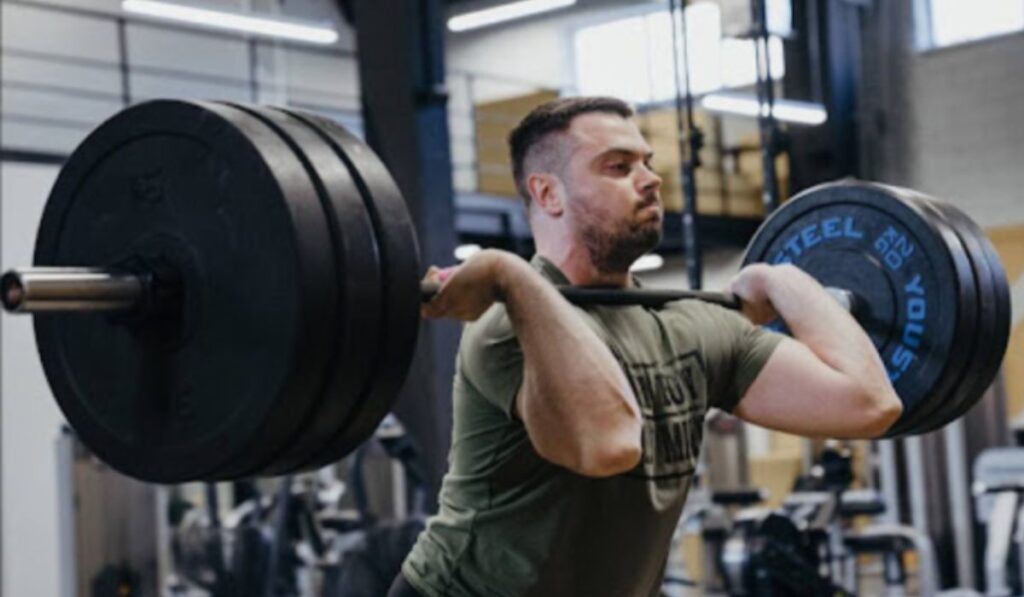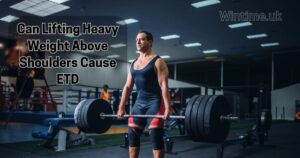Introduction
Can lifting heavy weight above shoulders cause etd: Eustachian Tube Dysfunction (ETD) occurs when the Eustachian tube in the ear doesn’t function properly, leading to discomfort, ear pressure, and hearing issues. Many people wonder if lifting heavy weights above the shoulders can trigger or worsen ETD. Physical strain, including intense weightlifting, may impact various parts of the body, but how does it affect your ears? This article explores whether heavy lifting can cause ETD and offers tips for protecting your ear health during workouts. If you’re concerned about ETD and lifting weights, read on to find out more.
Understanding Eustachian Tube Dysfunction (ETD)
Eustachian Tube Dysfunction is a condition where the small passage connecting the middle ear to the back of the nose doesn’t work correctly. Its primary function is to regulate ear pressure, but when it’s blocked or inflamed, it can cause discomfort. Symptoms of ETD include ear pain, hearing loss, a sensation of fullness, or popping sounds in the ear. Several factors can lead to ETD, such as allergies, colds, sinus infections, and environmental factors. However, can physical activities like lifting heavy weights be added to the list? Let’s examine this further.
How Lifting Heavy Weights Affects the Body
Lifting heavy weights, particularly above the shoulders, puts significant strain on the upper body. When lifting, your muscles tense, and you engage in deep breathing, which can create internal pressure in your body. This pressure, especially in the head and chest, can extend to your ears. During intense workouts, some individuals may experience ear pain or pressure changes. While lifting is beneficial for building strength, repetitive strain may impact sensitive areas, like the Eustachian tube, and potentially worsen ETD.
The Connection Between Heavy Lifting and ETD
Heavy lifting, especially when done improperly or with excessive strain, can lead to an increase in internal pressure. This pressure might affect the Eustachian tubes, causing temporary dysfunction or exacerbating pre-existing ETD symptoms. When you lift weights above your shoulders, the strain on your neck and head can cause muscle tension. This tension can interfere with the function of the Eustachian tubes, potentially leading to blockages. However, ETD caused by lifting weights is typically temporary and resolves after rest.
Preventing ETD While Lifting Weights
To avoid triggering ETD or worsening existing symptoms, it’s important to practice proper lifting techniques. Start by controlling your breathing during workouts, as holding your breath can increase internal pressure. Use lighter weights if you’re prone to ear issues and avoid straining your neck and head during overhead lifts. Stretching and warming up properly can also help reduce muscle tension and pressure. By paying attention to your body and avoiding overexertion, you can protect your ears while still achieving your fitness goals.
Symptoms to Watch for After Lifting Weights

If you notice symptoms like ear pressure, discomfort, or hearing changes after a workout, you may be experiencing a temporary form of ETD. The key symptoms include a feeling of fullness in the ear, popping sounds, or muffled hearing. These signs are your body’s way of indicating that internal pressure may have affected the Eustachian tube. While these symptoms may resolve on their own, if they persist or worsen, you should consult a doctor. Ignoring these symptoms may lead to more chronic ear issues.
Tips for Managing ETD Symptoms
If you experience mild ETD symptoms after lifting weights, there are several at-home remedies you can try. Yawning, chewing gum, or performing the Valsalva maneuver (pinching your nose and gently blowing) can help equalize ear pressure. Using a humidifier or saline nasal spray may also relieve Eustachian tube blockage. For those prone to ETD, incorporating anti-inflammatory foods or supplements into your diet may help prevent flare-ups. However, if symptoms persist despite these efforts, consult with a healthcare professional for proper treatment.
Should You Stop Lifting Weights If You Have ETD?
If you have been diagnosed with ETD, you don’t necessarily need to stop lifting weights altogether. However, it’s important to adjust your workout routine to avoid aggravating your symptoms. Avoid exercises that put excessive pressure on your neck or head, and focus on controlling your breathing. You may also want to consult with a fitness trainer who can help you develop a workout plan that supports your fitness goals without increasing your ETD symptoms. In most cases, modifying your routine can allow you to continue lifting safely.
When to Seek Medical Advice for ETD Symptoms
While mild cases of ETD may resolve with rest, persistent or severe symptoms should not be ignored. If you experience ongoing ear pain, pressure, or hearing loss that doesn’t improve, consult an ear, nose, and throat specialist (ENT). Chronic ETD may require medical treatment, such as decongestants, steroid nasal sprays, or even surgery in extreme cases. A healthcare professional can help determine the underlying cause of your ETD and recommend the appropriate treatment. Timely intervention can help prevent further complications and improve your ear health.
Conclusion
Can lifting heavy weight above shoulders cause etd: Lifting heavy weights above the shoulders can contribute to ETD symptoms, particularly if proper technique and breathing control are not maintained. The strain placed on your body during intense lifting can affect the Eustachian tube, leading to temporary dysfunction. However, with the right precautions, such as using lighter weights, controlling breathing, and modifying your workout routine, you can minimize the risk of ETD. If symptoms persist, consulting a healthcare professional is essential. Staying mindful of your body during workouts will help you stay fit without compromising your ear health.
FAQ
Q: Can lifting heavy weights above shoulders cause ETD?
Lifting heavy weights above the shoulders can contribute to ETD symptoms due to increased internal pressure and muscle strain, though this is usually temporary.
Q: What are the symptoms of ETD after lifting weights?
Symptoms may include ear pressure, popping sounds, muffled hearing, or a feeling of fullness in the ears.
Q: How can I prevent ETD while lifting weights?
To prevent ETD, control your breathing, avoid excessive strain, and use proper lifting techniques.
Q: Should I stop lifting weights if I have ETD?
You don’t need to stop entirely but may need to modify your workout routine to avoid aggravating ETD symptoms. Consult a fitness trainer or healthcare provider for guidance.










































